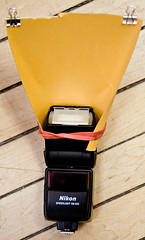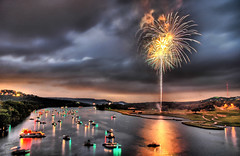Do-it-Yourself Tungsten OmniBounce
Originally uploaded by carpe icthus.
This popped up on a recent “strobist” search on flickr. I’m constantly surprised by the ingenuity of the strobist clan.
Notes from the photographer:
I had to shoot a giant gala tonight — close to 500 people. I knew most of the action would be happening in a place with very little light and a ceiling far too high to allow bounce flash. Furthermore, whatever ambient light there was would be VERY warm, about 2500K. And all I had was my no-frills SB-600.
So I went all McGuyver. I took the back of a reporter’s notebook (which would provide nice, warm bounce light to match the ambient), cut it down and fastened it to my flash with a sturdy rubber band. This is basically an industrial-strength, warm-light version of the old index card trick.
But I wanted a broad flash that would cover the frame, so I needed the top to fan out. I ran down to the coffee shop and got a few wooden coffee stirrers. I cut them to match the notebook and fastened them to each end with clips.
It looks silly, but worked marvelously.
[tags]diy, howto, flash, photography, strobist, nikon, sb-600[/tags]




